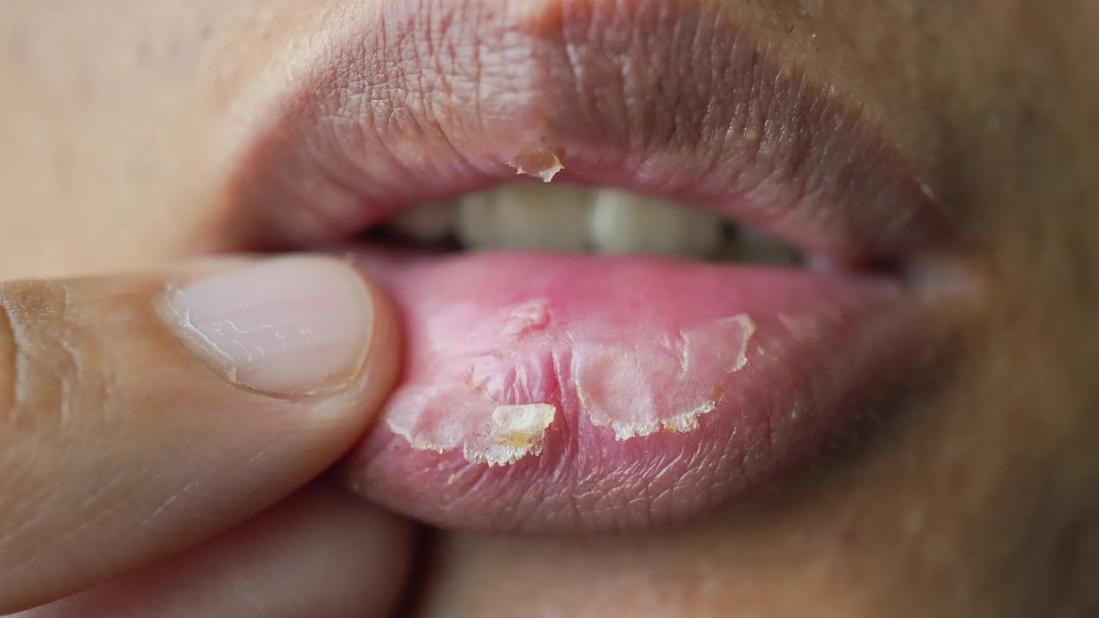Your bottom lip is 12 times more likely than your upper lip to get sunburned

Image content: This image is available to view online.
View image online (https://assets.clevelandclinic.org/transform/d3fa6e8c-bc76-440a-bd83-1c557f18a7c8/sunburned-lips-peeling-2177169321)
Fingers holding peeling and sunburned bottom lip
Your face gets more sun exposure than perhaps any other part of your body. It’s why dermatologists everywhere suggest wearing sunscreen every day — even when you wear makeup.
Advertisement
Cleveland Clinic is a non-profit academic medical center. Advertising on our site helps support our mission. We do not endorse non-Cleveland Clinic products or services. Policy
But the skin on your lips is thinner and more sensitive than other areas. So, it doesn’t take very long for your lips to burn with the rest of your face — and your bottom lip is 12 times more likely than your upper lip to get sunburned because of its constant exposure.
Dermatologist Lindsey Moore, MD, shares what makes sunburned lips a particular problem and how to treat or avoid them.
Similar to sunburns on other parts of your body, sunburned lips can be red and painful. They may also be:
Sunburned lips usually last anywhere from a few days to a week. How long it takes your lips to heal depends on your exposure to the sun, what kind of treatments you use and the severity of your burn.
If the sunburn on your lips gets worse or still hurts after a week, make an appointment with a healthcare provider. You also want to see a provider right away if your lips become so swollen that you have a hard time eating, drinking or talking.
“Sunburned lips also pose a risk for other problems, like infection from bacteria or cold sores, otherwise known as the herpes simplex virus (HSV),” says Dr. Moore. “When your lip barrier is compromised by cracking or peeling, these two issues can occur, causing pain and either crusting or blistering. It’s important to treat early to prevent spread of infection to others.”
Advertisement
Sunburned lips can be sore, but they heal with time and the right care. Start with a cold compress to reduce swelling and soothe discomfort. You can also apply pure aloe vera to help calm the burn, and take an anti-inflammatory, like ibuprofen, if needed. Moisturizing with a gentle balm can help the healing process along, too. But you shouldn’t pick your lips or pop any blisters — these will heal on their own.
Sunburned lips increase your risk of lip cancer, so try to reduce your risk whenever possible. Limit your sun exposure and wear lip balm or chapstick with an SPF of 30 or more. Reapply it every hour and immediately after swimming, eating or drinking.
“Sunburned lips, though often overlooked, can lead to discomfort and long-term problems if not properly treated,” reiterates Dr. Moore.
“Adding your lips to the long list of places that need sun protection will pay off in the long run. Year-round UV protection and remembering to use lip balm with SPF 30 on even cloudy or cold days is very important when it comes to your health.”
Advertisement

Sign up for our Health Essentials emails for expert guidance on nutrition, fitness, sleep, skin care and more.
Learn more about our editorial process.
Advertisement
Lip balms and ointments, drinking more water and running a humidifier can help eliminate dry lips
Pay attention to the ingredients in your favorite products — and how often you’re using them
Using salicylic acid or benzoyl peroxide can help clear up breakouts near your lips
TLC for lip wounds
Several conditions, like vitiligo and fungal infection, can cause a loss of pigmentation, leading to white spots or patches on your skin
This cooling gel can help soothe sunburned skin, but it can’t cure the burn
You know it’s not good if you’ve been holding onto it for more than three years or if it’s changed in color, consistency or smell
The convenient option is good for touch-ups, but it shouldn’t replace your traditional sunscreen
Prioritize your health by managing stress, strengthening your social connections and getting quality sleep
Bolsters, blankets, pillows and blocks can offer extra support, stability and comfort
Allergies, postnasal drip, asthma or reflux could be to blame for a cough that won’t quit